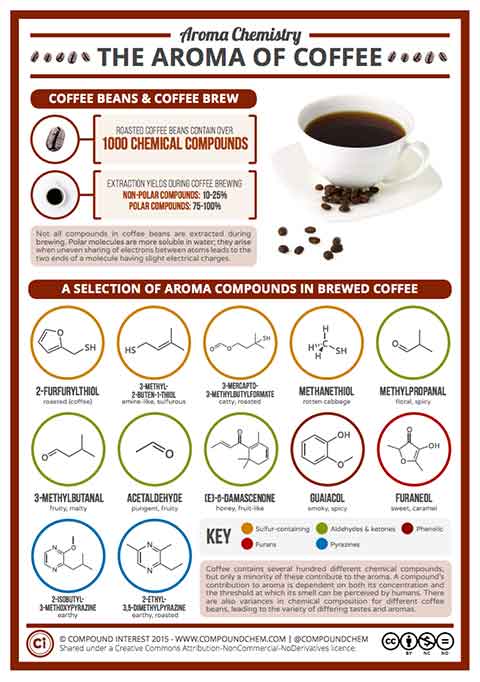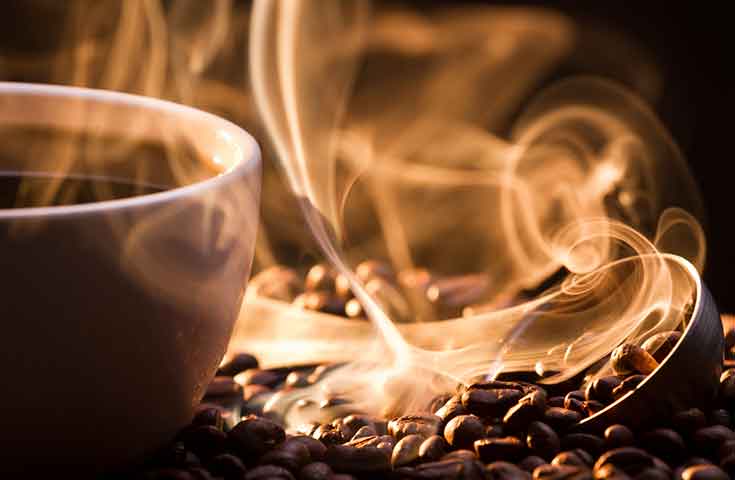I was sitting at my desk this week, furiously bashing the keys to produce an article for a 5pm deadline, when a familiar smell caught my nostrils and my attention. It was the all too familiar and tantalising aroma of a fresh pot of coffee wafting across the office. It’s not just the smell of brewed coffee that I love, either, but the rich aroma of fresh ground beans, too.
I think I might love the way coffee smells even more than its taste!
And I’m not alone. In fact, a lot of people I speak to who have yet to discover their love for the taste of coffee (give it time…;)), admit that they still love the smell. If you can make coffee taste as good as it smells, then, maybe you’ve truly arrived at #betterofficecoffee!
So this week, I decided to put my science hat back on and find out just why coffee smells so darn good?!
What Creates the Coffee Smell?
Now, forgive me if I wade too deep into the chemistry in this column. I’ll try to explain the science as concisely and simply as possible, but the fact is that the answer to the question ‘Why does coffee smell so good?’ is far from simple. As the graphic below by Compound Chem illustrates, a complex collection of (at last count) almost 800 compounds are responsible for the aroma of coffee!

Small, light and volatile organic compounds that easily evaporate at room temperature and pressure are responsible for the airborne aromas of freshly brewed coffee. They are typically produced by the reactions between proteins and sugars and the degradation and decomposition of other compounds during the roasting process.
You don’t need to know all 800 compounds to understand why coffee smells so great, though. They can be broken down into a few classes. Pyrazines, for example, are the aromatic compounds that contribute most to the roasted, walnutty, toast-like aromas in coffee, while the pyrroles can be credited with its sweet, caramel and mushroom-like smells.
That’s about as simple as I can make what is quite complex chemistry (way beyond my GCSE level!), but I think the most important thing to know in the context of your better office coffee is that coffee aroma is directly linked to the quality of the coffee beans:
“coffee aroma is the most important attribute to specialty coffee… instant coffee lacks most of the aromatic volatile compounds causing a dramatic decrease in the overall coffee flavour”
That’s why if you want to have better smelling as well as better tasting office coffee, then you need to be selective about the coffee beans and brewing processes you use.
Tell us what you love so much about the way coffee smells. Does it help wake you up in the morning? Does it help conjure fond memories of the past? Or do you just love the way it makes the office smell? Let us know in the comments section below or on Twitter @Abe_Greener.
Thanks for reading, and I look forward to seeing you all again in a couple of week’s time for the next column…





Hi Abe,
Indeed, the smell of freshly-ground coffee is wonderful I know lots of non-coffee drinkers who love the smell. It’s also something that I come across when talking to baristas one-to-one; they’re always keen to smell the coffee, something the regularly coffee shop goer misses out on. It’s an important part of the process of making coffee and I wish there was a way that the customer could be more involved rather than just receiving the finished cup of coffee at the end.
Brian.
Hi Brian,
Thanks for the comment. I agree, it would be great of customers could be involved, and could fully experience the complex aromas that baristas enjoy as they pull the espresso. I guess this is where in-house roasteries are so powerful. Many times I’ve been drawn into a coffee shop by the smell of a fresh batch of roasted coffee. Paper Cup, as I mentioned in our article a couple of weeks ago, was great for that.
In any case, the smell is one of the best parts of #betterofficecoffee.
Thanks again, always glad to hear your take on these topics. Keep the comments coming!
Abe